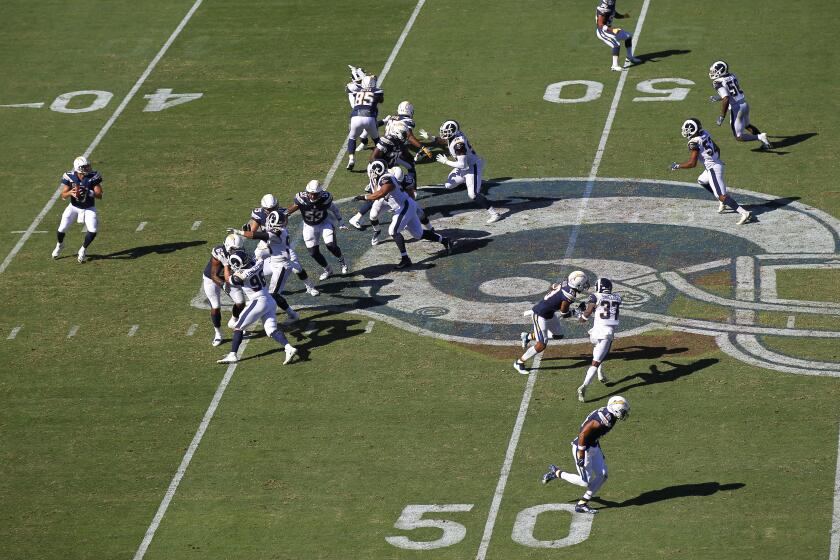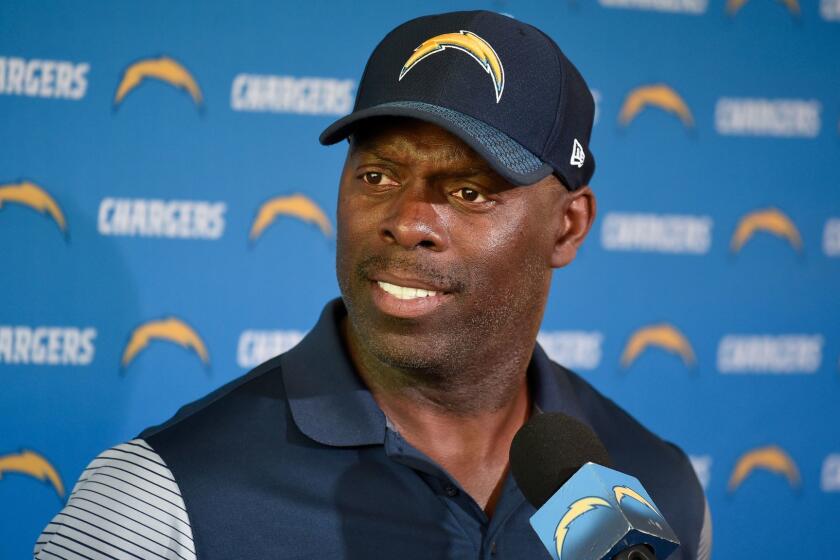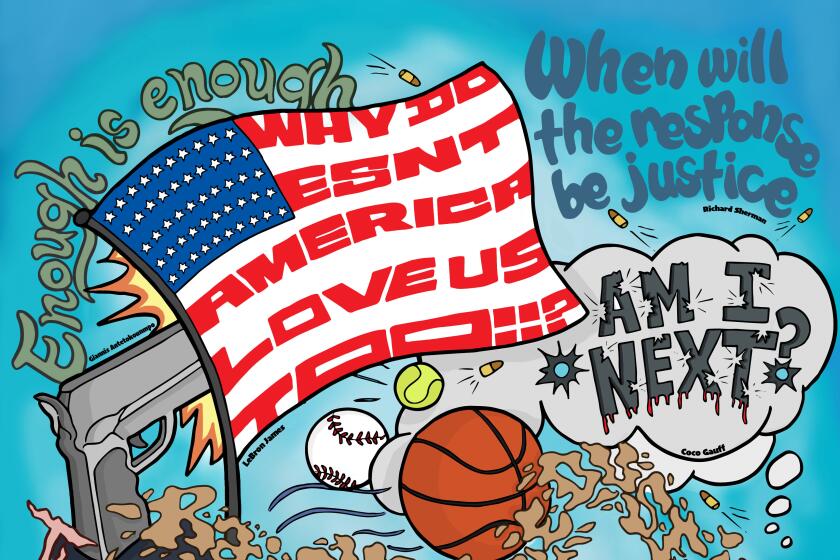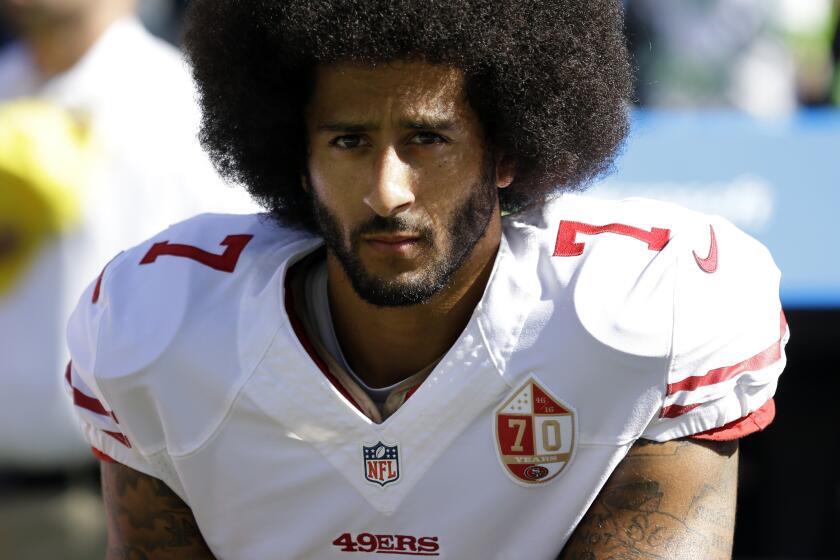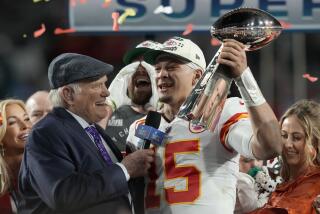Richard Sherman, Robert Woods and Tony Dungy discuss racism and the NFL

- Share via
Football stars Richard Sherman and Robert Woods, Super Bowl-winning coach Tony Dungy and Los Angeles Times columnist LZ Granderson gathered for a Zoom teleconference Thursday morning to discuss social justice, racism and the NFL. Sam Farmer, the Times’ Hall of Fame NFL reporter, moderated and steered the conversation. Here’s how it went:
What do you hope people are hearing now? What events have crystalized the conversation?
DUNGY: I think what happened is people saw visually what they had been hearing about for a number of years. When you hear it, then your question becomes, “Did that really happen? Are there other things to take into consideration? Maybe it’s not exactly the way I heard.” But seeing it visually has been so much different. I think this could be what actually ends up moving the needle. And we have heard it for a while. I remember on “Football Night in America,” we did a story on Kenny Stills and Michael Thomas and their kneeling for the national anthem with the Miami Dolphins. It was really in response to an incident that happened in Minneapolis, Philando Castile. Kenny has some ties up there, and he said, “I want to make a difference in what’s going on in Miami, and we want to bring this to light.” We did a story and it was a great piece. But people at that time didn’t want to hear about it. They got so caught up in, “Is the kneeling patriotic or unpatriotic?” That they didn’t hear the message from these guys.
That’s what we wanted to do, show what Kenny and Michael were doing and the things that they had done to bridge the community and the police department. And it was fantastic. But I think now we’re being forced to revisit that, and we’re hearing these voices of these young men and women who are saying, “I want to speak up for people who don’t necessarily have a voice.”
These aren’t words on a page, but technology, video AND images that evoke empathy in people
WOODS: I agree with what Tony was saying. It’s almost as if you couldn’t turn a blind eye to it. It was everywhere. All over the news, all over social media. No sports going on. No concerts or activities. So this was all we were seeing, just information on injustice, police brutality, what was actually going on. You have people who had time, were able to go out and protest, not being able to work. They were actually able to stand for the cause and for the reason. The kneeling four years ago brought alertness and awareness to what was going on. But I think now that everyone is aware of the situation, people are pushing for change, and you see some change is already happening.
‘Hard Knocks’ will feature the Chargers and Rams moving forward amid coronavirus. It’s the first time the show, to air Aug. 11, will star two teams.
How does this transform from a moment to a movement?
GRANDERSON: I can’t help but look at this and just think that the Lord works in mysterious ways. The country and the globe essentially shut down because we needed to prepare ourselves to deal with a virus that was going to quite possibly threaten society. And we thought the virus was coronavirus, but it’s actually racism. Racism is the virus that’s been killing us much longer than coronavirus. We’ve been hesitant to address it head on in very substantial ways. We’ve seen throughout society, especially here in the United States, we’ve seen progression and regression. Fortunately for us, the progression has always exceeded the regression. But there’s always been that yin and yang, that pulling effect.
So you’re asking about what do we do to keep this thing going. I would argue that it’s always been going. The question is, will the participants who have joined in this go-round stick with the plan? African Americans, Blacks, Native Americans, Japanese Americans, Latinos … we’ve never not been engaged in this fight. We’ve had to. The question is, how do we keep the white Americans who may have thought it wasn’t as serious, who may not have felt this was their fight, to stick with the fight? That is how you keep this element of the momentum going, by having white athletes, white owners, white executives, white CEOs, realizing this isn’t something you write a check for and then move on. This is something you need to roll your sleeves up on and stay in this fight the way that some white people have, and so many minorities have been forced to deal with.
DUNGY: It’s almost been a perfect storm, and I do believe God orchestrated it. We’ve had video of incidents like this in the past, but life was going on. Everybody would see it and say, “Oh, that’s a shame,” and then go back to work, go back to what they were doing. But for a month now we haven’t been able to do that. We have been arrested, so to speak. I do think God orchestrated it. And now it’s, what is that going to do to change hearts? Because that’s where this is going to come from. It’s going to be people who see this, who think about it, who react and say, “You know what, we do have to do something.” And it’s got to be a heart change.
WOODS: For me, I always go back to when Colin Kaepernick was kneeling, when Eric Reid and Kenny Stills were kneeling. You see these guys lose their jobs. Brandon Marshall losing marketing deals. Four years ago, you see that and say, “Man, I need this job to be able to get some funds and be able to give it back.” But I think now you see it as a sacrifice for athletes now, where it’s, “Let’s all take a stand.” You see a lot more players, actors making videos for Hollywood. It’s definitely growing. But it’s not turning a blind eye. Everyone is on board — your coaches, your owners. Really just checking yourselves. You think it doesn’t involve you, but it really involves every single person.
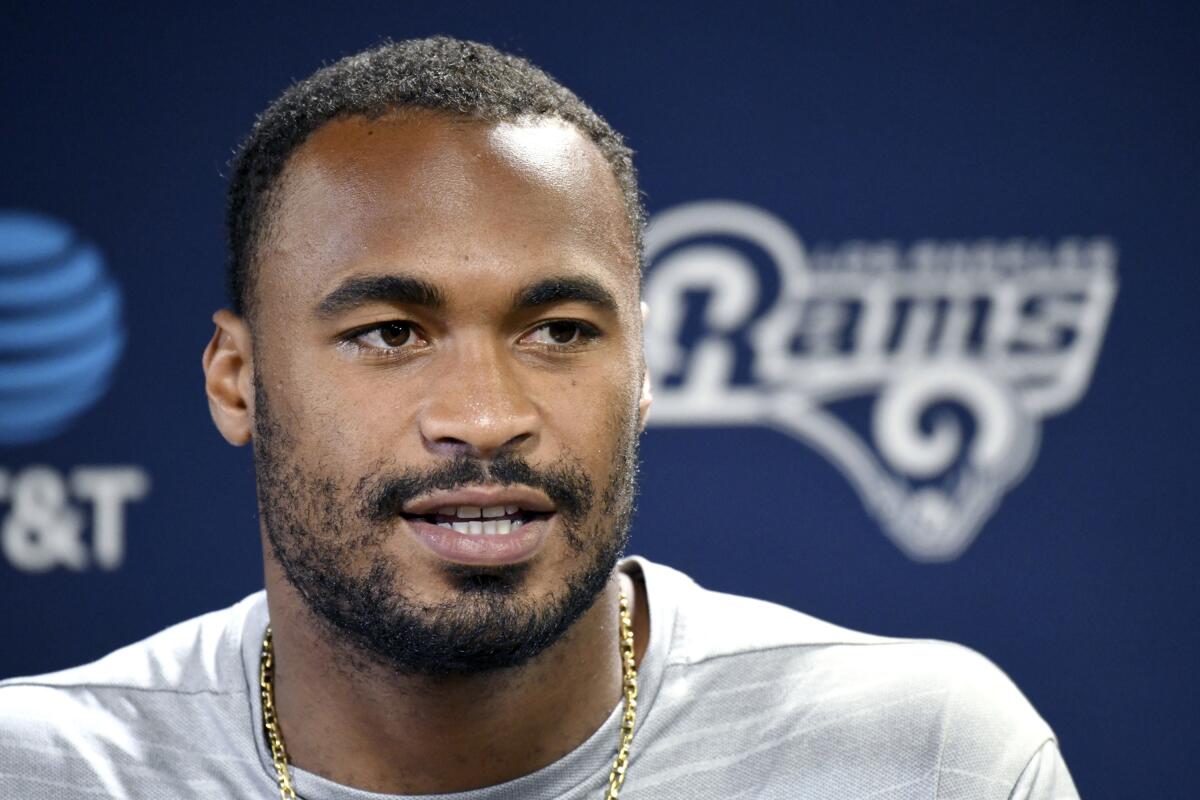
GRANDERSON: We always go back to that image from the 1968 Olympics in Mexico City. We know the brothers with the leather-clad fists in the air. We know all about John Carlos. We know Tommie Smith. But it’s important that we talk about Peter Norman too. The white guy who was there. He also sided with those two brothers. He also went back home to Australia and had a very difficult time being reassimilated into society. He was ostracized. He’s the one that ended up dying first out of everyone, because of the alcoholism and trying to deal with what it meant for him to stand on the side of justice.
The one thing that I’ve been trying to drive home is that the impetus isn’t on Black people or Black athletes to end white racism. The impetus is on people like Peter Norman. Where are the Peter Normans who are willing to stand with their brothers and sisters in this and stick with it no matter what the costs may be? That’s an important element to all of this, whether or not the imagery of seeing white people marching resonates with people or not, the reality is, as far as I’m concerned, it lets me know that you know exactly what we’re fighting for, what this is about, and it isn’t just helping other people. This is something that’s helping you too. You’re a part of this.
What did Dr. King say? We came on different ships, but we’re all in the same boat now. That’s what this is.
DUNGY: I was asked three or four years ago, when all the flag protests started, what would I do if I was a coach? If I was still in the NFL, how would I handle it? I said at that time that if I were Roger Goodell or I was coaching, I would bring my guys in and say, “Hey, what is your issue? What are you concerned about? What do you want voiced? And let’s figure out a way to give you that voice.”
I would have taken part of my press conferences on Mondays and said, “I’m going to turn this over to my players. They have some concerns. I want to give them a voice and let them be heard.” I think that’s what we have to do is come together and discuss it. If I were the president of the United States, I would not just shut everything down. I would say, “We’ve got some young, intelligent, impressive men of influence, and they feel like something’s wrong. I need to invite them, listen to them, see what’s on their mind, see what solutions they have, and see if we can come together on this.” I think that’s what the NFL should do, and that’s what our governmental leadership should do.
Tyrod Taylor is the Chargers’ starting quarterback and he has two backups, but coach Anthony Lynn said Colin Kaepernick fits the team’s scheme.
SHERMAN: In [2017], when Trump made his comments, Pete Carroll pretty much did what Coach Dungy said he would do. He stopped us — it was before we played the Tennessee Titans — put us all in a room. This was late; I think we canceled meetings or something. And he asked us, “What do we want to do?” Because there were a lot of group texts going on between various teams throughout the league. There were conversations going on between us and the Titans: “Are we going to to do something united?”
At the end of the day, it was tough to come to a conclusion because there were so many people in our league that agreed with us, that are part of the brotherhood, that are part of the locker room, but they were not willing to sacrifice their relationships with their families — rightfully so — to take a stand with their teammates.
There were conversations had behind closed doors where it was like, “Hey, I want to stand with you guys. I want to make the point. I want to protest. I want to do my part. But if I sit, I kneel, I do anything, then I won’t be able to go home to my family. Because my family sees this a certain way. It’s hard for me to explain to them how to understand this.” So the stance that the league has taken over the last few years, it’s hard for them to come back and rebuke what they’ve already done. The damage is already done. So there’s really nothing they can do. The players are doing everything in their power to use their platforms or their social media, whether it’s press conferences, using their own money, their foundations to reach out and do the actual work. Whether it’s the Players Coalition and the people like Malcolm Jenkins or Anquan Boldin, going out there and trying to legally change things, change it in Congress and in law. But at the end of the day, the league is going to throw money at it. If they really cared, it would be a different story. But they already showed that they didn’t really care about the issue, so once they already made that stance, it’s hard to come back off that. It hard to come back and say, “Hey, we care now. Hey, Colin Kaepernick was right.” It’s hard for Goodell to say, “Hey, hire Colin Kaepernick. Get him a job.” It’s difficult for that to have meaning and truth.
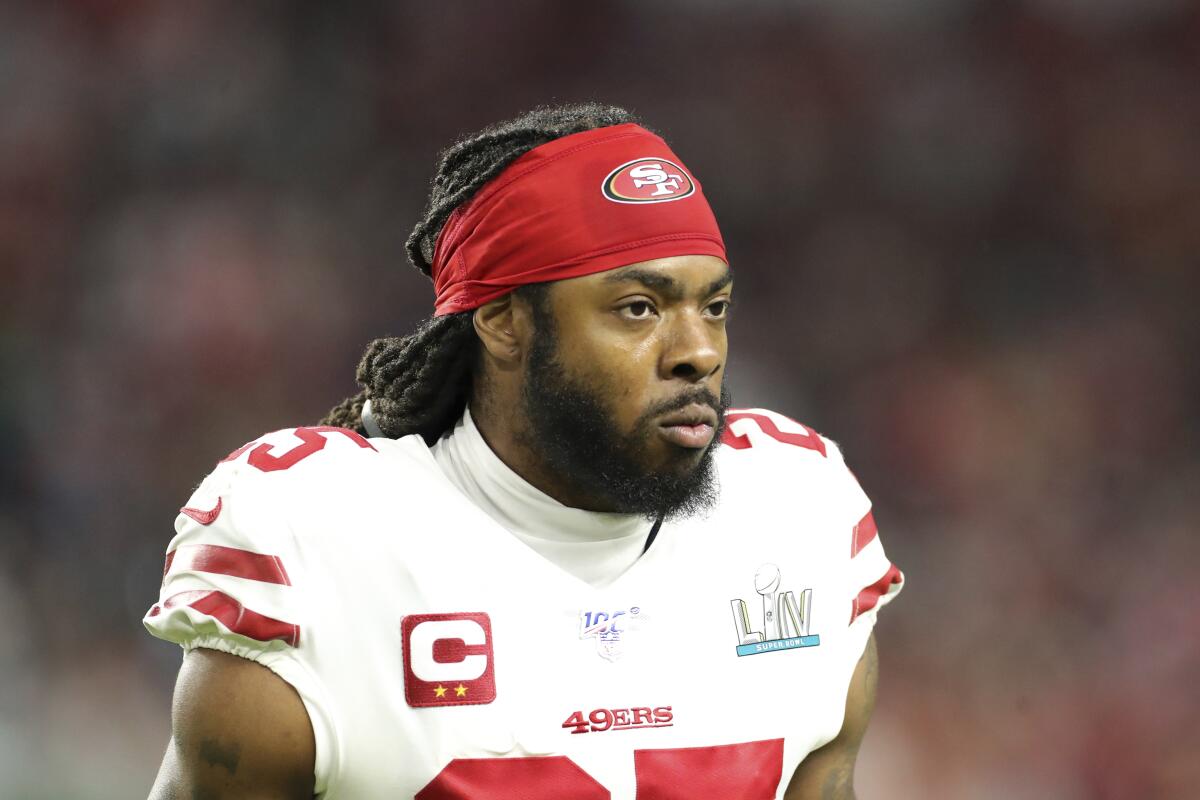
Can you express the exasperation people are feeling?
SHERMAN: Just about any Black person in America could express that. It’s one of those things that you’ve dealt with your whole life and it’s always been swept under the rug of society. We learn different rules growing up. We learn how to deal with police, how to deal with authority figures, how to not look intimidating, how to not be the angry Black man, how to be calm. Because those are things you need to be able to maneuver in this world as a Black man. If I’m a white suburban kid, I don’t have to learn how to deal with cops and keep my hands on the steering wheel, no quick movements, sometimes put your hands out the window to make sure that you’re not threatening. If anybody runs up on you, try to not seem confrontational. Your parents teach you those things. Even in college, you have people walking by you grabbing their purse. Because if they don’t know who you are, if you’re not wearing athletic gear, then you’re just an intimidating Black man to them. Angry Black man.
So I think in society there have been these constraints and these stereotypes for so long that it’s time to tear them down. But it’s going to take more than just Black people. Black people have been upset, because we’ve been persecuted, we’ve been harassed by police our whole lives. Every time you go out anywhere, you drive and the police pull up behind you, you know it’s bad. In L.A., as soon as they get behind you, you know, “I’m getting pulled over. My day is going to be ruined today.” So it’s hard for me to fully explain the frustration. But I think people are trying to express it and finding different ways to express it, whether it’s protesting, rioting, burning down buildings, etc. Not to say it’s the right way, but that’s how people are expressing their anger, because it hasn’t changed. It’s been cyclical. Ever since the Rodney King beatings. Everybody went crazy, then it went away. It’s kind of the same thing happening right now. But it’s happening on a bigger scale.
GRANDERSON: I think you’re seeing some trends that haven’t happened before. I look at the situation that’s happening with Oklahoma State and Coach Gundy, and there’s an uprising, there’s an awakening there. I think about what happened with Dabo Swinney and Clemson. There seems to be an awakening there. There are certain elements of this conversation that has sustaining power. The question is, what are white university presidents, CEOs, team owners, what are they going to do to stay involved in this conversation? Because I don’t foresee any time soon the people of color what have been out in these streets, people of color who have been saying, “This guy said the N-word. This guy is wearing a T-shirt that represents X, Y and Z.” I don’t foresee that taking a backseat to anything, not any time soon. However, I am curious as to whether these statements that are being released, whether you’re talking about the Confederate flag, whether you’re celebrating Juneteenth all of a sudden as if it’s a brand new holiday, I don’t know if any of those things are going to be around a year from now without white people, and white people in the rooms where these things are happening, being vigilant.
So I guess the real question is whether the white people in these positions are really serious about being anti-racist, rather than just trying to win the press conference because right now racism is not in fashion.
DUNGY: I would echo that. I remember 1968 and trying to process what was going on in the aftermath of Dr. King’s killing. My dad taking us and sitting us down and saying, “Here’s what the world is like. And there are people who are going to dislike you for no reason, just because of what you look like. There are going to be people who think differently. But in this house, this is how we’re going to treat people. We’re going to treat people with the love of Christ. We’re going to treat people with respect. Doesn’t matter how they treat you, that’s what we’re going to do in our house.” To me, that’s what’s got to happen in this. Everybody around the country who sees this and are upset, they’ve got to start at home and say, “First of all, I may have to make a change in how I do things. But at least with people in my home and my sphere of influence, I’m going to make a difference. Then when I go to work or I’m in my neighborhood, I’m going to have the boldness to make a difference.” That’s how we’ve got to start it. It’s got to be changing hearts one by one. That’s the way it’s going to be long lasting. Otherwise, like all of us have said, it will be cyclical. We’ve seen it before. When people go back to work after the pandemic, if there haven’t been those thoughts and discussions, it will go back to, “Oh well, let’s just hope nothing else happens in the near future so we can move on.”
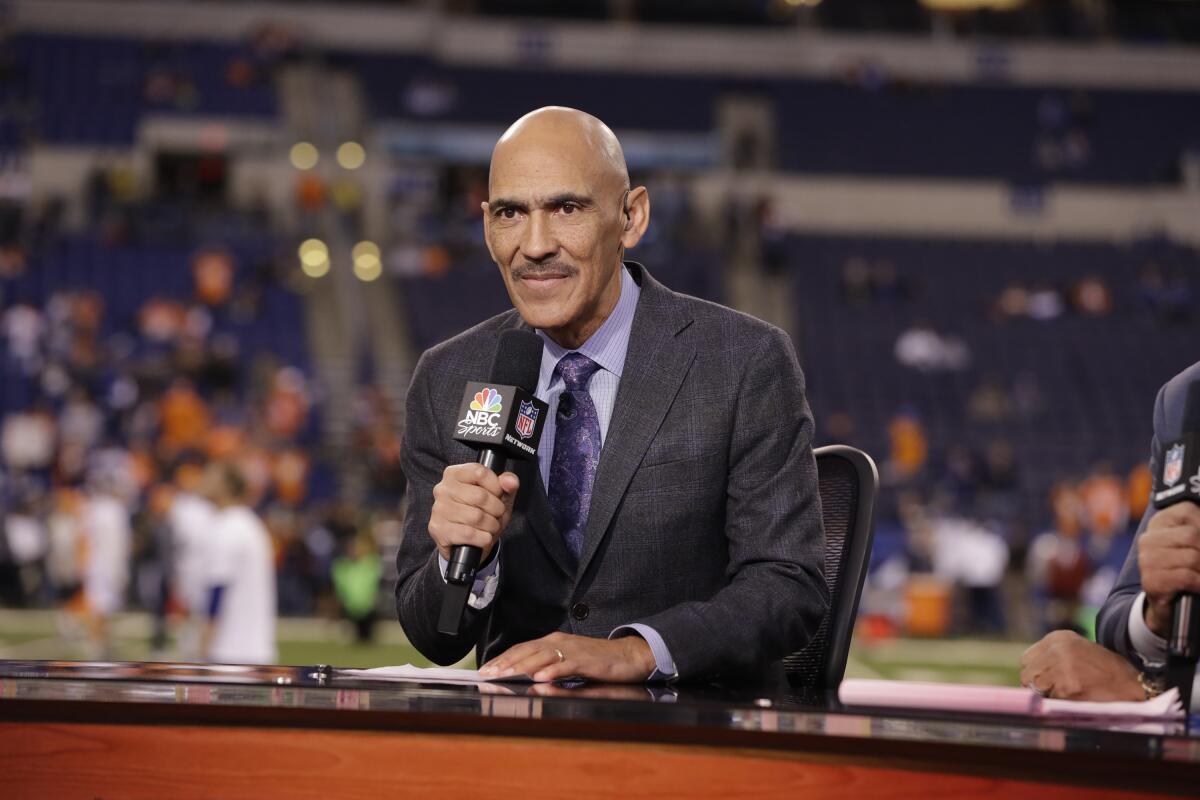
GRANDERSON: There needs to be honesty and boldness in these conversations. Stop talking about this issue like aliens came down and implemented this draconian system that has oppressed one group of people. No, we did this to ourselves. We need to confront that truth and stop looking for flowery language because we don’t want to hurt people’s feelings. Well, you know what, people are dying. So to hell with your feelings. This is why they are dying. Let’s stop allowing certain flowery language around the Confederacy to cover up the fact that we’re concerned about losing revenue from a certain generation or population of people.
We know what the flag is. We know what the name of the Washington football team really is. We know what these things are. Let’s stop trying to be respectful of people who may be harboring damaging ideology that’s leading to deaths. We need to stop doing that, and just be real with it.
WOODS: I think it starts at home, starts in school. But one thing that me and another teammate were talking about is, there are some people who never have interactions or encounters with white people or Black people almost their whole life. They grow up not seeing a Black person, not seeing a white person. It’s like, how can we incorporate these teachings early on to where you may not have an encounter but you know some experience, you know the history, you know about it. Not many people even know about Juneteenth. That should be implemented in our history. You really think, why not?
SHERMAN: It’s the history that they want to ignore, the history that they want to glaze over. Imagine in Nazi Germany, the Germans just saying, “Hey, we don’t want to talk about Hitler. We don’t want to talk about Stalin. We don’t want to talk about what happened in those evil times. We don’t want to talk about the terrible things that went on. We just want to gloss over it.” That’s kind of what America does with slavery, with the Civil Rights movement, with the Civil War. That’s why things like the KKK can still exist and not be a terrorist group, not be frowned upon. That’s why the Confederate flag can still be waved even though they fought to make sure Black people stayed enslaved.
There’s so many people that subscribe to that ideology in power, in politics. It’s an old line of thinking, but it’s deeply rooted in our system in such a way that it’s hard to get it out without getting those people out. And they’re in such powerful roles, the system is designed for them to be successful. The system is designed for them to stay, and for their next generation and next generation to stay. Until we weed those people out, until we resod the grass, we dig those roots out of our government, out of our freakin’ society, we’ll continue to have these problems. No matter how many suits they put on, even if they don’t put a white hood on anymore, the way they think and the way they regard people of color and African Americans are beneath them. ... So as long as we have that line of thinking in our country, things won’t change. Especially if it comes from elected officials. During Trump’s time, you see it coming out more and more. People are becoming more bold even government officials, and everybody’s outraged: “Oh my God, look how they’re talking.” That’s how they’ve always thought. They just haven’t been in power and emboldened like they are right now.
We need to take these messages and take these people who are putting themselves out there and eliminate it.
In the wake of the George Floyd killing, athletes and leagues have led with bold words and actions, but will the power of their protest carry over to the games?
WOODS: I see a little bit of accountability coming up now, people getting fired for some racist remarks. But I think the biggest thing is, how long will this accountability last? Will it just fade away once work begins and the pandemic ends? It’s just about accountability, being honest, holding the top people — CEOs, owners — accountable. Not just now during what’s going on. It’s long term.
How will players respond when the season starts?
SHERMAN: I anticipate players making a stand, whether it’s taking a knee, or using their press conferences — players give press conferences every week — so I expect a lot more of them to convey these messages, to convey messages about police brutality, equality, the systematic racism that’s been going on. And to have statistics. Because we have really intelligent and sharp players in our league who get the information and convey it. That’s the part where fans are going to have to work with us a little bit.
With football, you want to forget about politics. You want to forget about all the stuff you have going on. But right now you can’t. When you haven’t seen a Black person your whole life, you don’t interact with them on a daily basis, but your favorite player is a Black player, there should be some kind of relationship and empathy there, but there isn’t.
Us using that platform to make the point might turn some fans off, but it is what it is. Guys are going to continue to fight the good fight.
WOODS: I see a lot of players kneeling this season. I personally thought it was bringing awareness to police brutality. I’d personally rather see a lot of action take place, in press conferences or even just being out in the community a lot more. Even the teams being more vocal in the community. I know the Rams want to double down with the Brotherhood Crusaders, with the Watts Rams. But you can just take it as players, doing it on your own, going out in the community and having an impact. Anything to bring voters out, bring change.
After George Floyd’s death, the NFL apologized for not doing enough to fight racial injustice, but it needs to restore what it stole from Colin Kaepernick.
DUNGY: I don’t think it can be just the kneeling. Obviously the feeling about that is much different than it was four years ago. I think that will be accepted more. But it’s really taking advantage of those press conferences, getting your voices out there and saying, “This is what I see. This is what’s going on in my community. This is what needs to happen as a solution.” Then that young fan who maybe doesn’t know you but you’re his favorite player, he says, “Man, Richard Sherman is concerned about this. Maybe I should be impacted by it.”
GRANDERSON: I would encourage you to call out the media as well. We can be quite hypocritical ourselves. If JJ Watt wanted to raise money for hurricane relief, that’s OK to use your platform to talk about that. But if you talk about police brutality, all of a sudden now you’re supposed to stick to sports.
Joe Burrow talks about what happened to his community, and everybody starts pouring in money to help uplift the area, which is a great thing. But if a brother does the same thing about what’s happening in his area, he’s told to shut up and dribble. So it’s OK to call us out too when we have blind spots, whether they’re purposely done or not.
What should happen with Kaepernick?
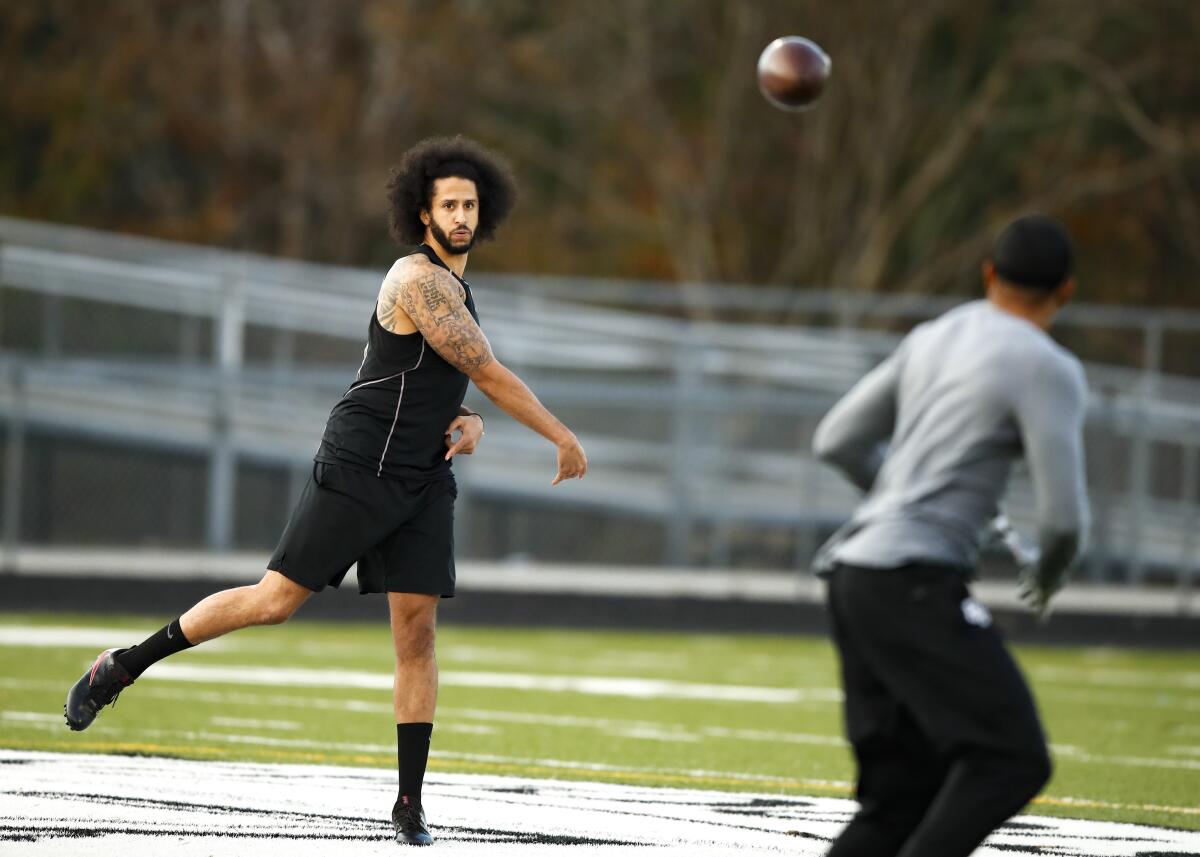
SHERMAN: People make a big hubbub about he hasn’t thrown a pass in however many days, but there are tons of backup quarterbacks in this league who haven’t thrown a pass in a live game outside of the preseason in a really long time. So I don’t think that will matter. It’s like riding a bike. He’ll get out there, he’ll get a feel, he’ll maneuver, and he’ll play as he always played. But I don’t think teams are willing to do it, as they haven’t been. Now there’s more conversation about it. But if teams were willing to do it, they would have done it years ago. Teams were literally willing to put a worse player on the field at quarterback and lose games than to give this man a job. So if your franchise was thinking that way in 2016, 2017, 2018, 2019, what changes now? You’re literally willing to throw your season away instead of signing this guy. I don’t know if that’s changed.
DUNGY: I hate to disagree with Richard, but I think a lot of people in the league respond to political correctness. Three years ago, it wasn’t politically correct. Now, maybe it is, or it’s seen in a different light. I hope he gets a job, and I think he might because of the climate change.
GRANDERSON: We’re in an election year. The president, when he first started tweeting, was freshly in office and had all the capital. Now since then he’s been impeached, he’s embattled. He’s facing questions about how he’s handled this pandemic, so he’s not operating from the same place of strength, and perhaps some of the owners no longer feel as if they need to be afraid of what he can do with his Twitter account. I think that’s also contributing to the change in climate.
More to Read
Go beyond the scoreboard
Get the latest on L.A.'s teams in the daily Sports Report newsletter.
You may occasionally receive promotional content from the Los Angeles Times.

